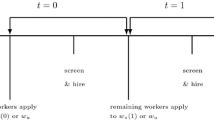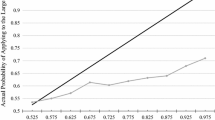Abstract
The largest market in national economies is the labor market. Labor market contracting is characterized by job search, often from unknown wage offer distributions. This paper reports experimental tests of finite horizon models of job search in which the wage offer distribution is unknown. Theoretically-optimal search from an unknown wage offer distribution can have the seemingly paradoxical property that some offers will be accepted that are lower than other offers that will be rejected in the same period of the search horizon. Thus the reservation wage property (or lowest acceptable wage path) may not exist. This can occur because an offer that is a priori relatively high (“good news”) can imply that it is highly probable that search is from a favorable distribution, and such an offer can look unattractive when it is an a posteriori relatively low offer from a favorable distribution (“bad news”). This paper reports results from experimental treatments for search from unknown distributions in which the reservation wage property does exist and treatments in which it does not exist. We find that the consistency of search behavior with search theory reported in earlier papers is robust to the presence or absence of the reservation wage property and to whether the draws come from known or unknown distributions.
Similar content being viewed by others
References
Braunstein, Y. and Schotter, A. (1981). “Economic Search: An Experimental Study.” Economic Inquiry. 19, 1–25.
Braunstein, Y. and Schotter, A. (1982). “Labor Market Search: An Experimental Study.” Economic Inquiry. 20, 133–44.
Cox, J. and Oaxaca, R. (1989). “Laboratory Experiments with a Finite Horizon Job Search Model.” Journal of Risk and Uncertainty. 2, 301–29.
Cox, J. and Oaxaca, R. (1992a) “Tests for a ReservationWage Effect.” In J. Geweke (ed.), Decision Making under Risk and Uncertainty: New Models and Empirical Findings. Kluwer Academic Publishers, Dordrecht.
Cox, J. and Oaxaca, R. (1992b). “Direct Tests of the ReservationWage Property.” Economic Journal. 102, 1423–32.
Cox, J. and Oaxaca, R. (1996). “Testing Job Search Models: The Laboratory Approach.” In S. Polachek (ed.), Research in Labor Economics, Vol. 15. JAI Press, Greenwich.
Devine, T. and Kiefer, N. (1991). Empirical Labor Economics: The Search Approach. Oxford University Press, New York.
Grether, D., Schwartz, A., and Wilde, L. (1988). “Uncertainty and Shopping Behaviour: An Experimental Analysis.” Review of Economic Studies. 55, 323–42.
Harrison, G. and Morgan, P. (1990). “Search Intensity in Experiments.” Economic Journal. 100, 478–86.
Hey, J. (1982). “Search for Rules for Search.” Journal of Economic Behavior and Organization. 3, 65–81.
Hey, J. (1987). “Still Searching.” Journal of Economic Behavior and Organization. 8, 137–44.
Kogut, C. (1992). “Recall in Consumer Search.” Journal of Economic Behavior and Organization. 17, 141–51.
Rights and permissions
About this article
Cite this article
Cox, J.C., Oaxaca, R.L. Good News and Bad News: Search from Unknown Wage Offer Distributions. Experimental Economics 2, 197–225 (2000). https://doi.org/10.1023/A:1009910627375
Issue Date:
DOI: https://doi.org/10.1023/A:1009910627375




